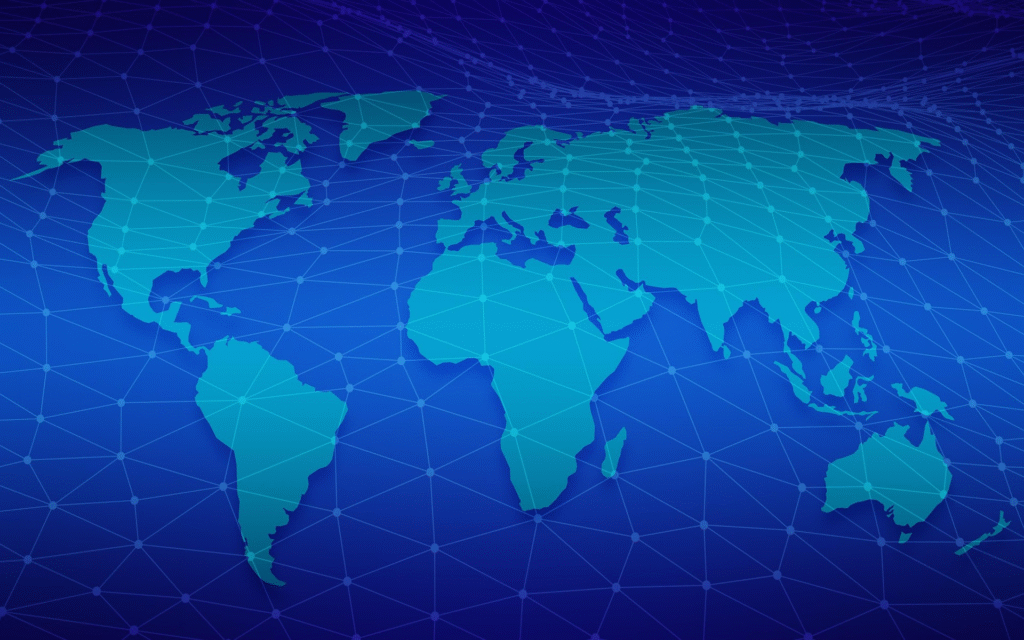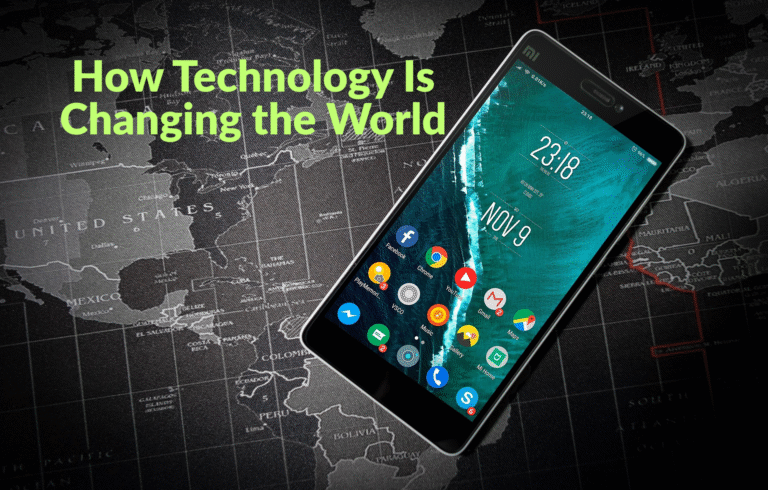How Technology Is Altering the World: Technology is revolutionizing every facet of our lives at an extraordinary speed. From our methods of communication and education to our approaches to work, travel, and healthcare, advancements are significantly transforming society. The digital era has made information much more attainable, enhanced worldwide connectivity, and created limitless opportunities for advancement.
Simultaneously, it presents difficulties such as issues related to privacy, the loss of jobs, and moral questions. Comprehending how technology is transforming our world enables us to manage its effects more carefully and get ready for a future where human existence and technological progress are more interconnected than ever.
How Technology Is Changing the World.

Technology is more than just a component of contemporary existence; it serves as the catalyst for the evolution of society, various industries, and daily experiences. Innovations such as smartphones, artificial intelligence, biotechnology, and renewable energy are rapidly altering the landscape of our world. Whether we examine our methods of communication, education, employment, or healthcare, the influence of technology is significant and extensive.
In this paper, we will examine the main sectors where technology is transforming the globe: communication, education, healthcare, business, the environment, and the future of humankind.
(1) Transformation in Communication.
How Technology Is Changing the World: One of the most apparent transformations caused by technology is in the manner in which individuals interact. Only a few decades prior, communicating over long distances was both slow and pricey. Letters could take days or even weeks to be delivered, and making international calls came with a high cost.
Nowadays, communication is almost immediate because of the internet. Real-time global connections are made possible by social media platforms, messaging apps, and video calling services like Microsoft Teams, Zoom, and WhatsApp. This change has facilitated international cooperation in business, science, and education in addition to enhancing interpersonal ties.
Furthermore, many people who didn’t have a voice before now have one because to the growth of digital communication. Social media has developed into a forum for political activity, cultural exchange, and advocacy, enabling people to share their experiences and call for change.
(2) Revolution in Education.
Education has changed dramatically as a result of technology, which has made it more participatory, personalized, and accessible. Regardless of location or socioeconomic status, millions of people now have access to top-notch education thanks to online learning platforms like Coursera, Khan Academy, and edX.
Students may learn on their own terms and at their own pace thanks to educational apps, learning management systems (LMS), and virtual classrooms. Remote learning resources were crucial in sustaining education during school closures, particularly during the COVID-19 epidemic.
With its ability to discover learning gaps, automate grading, and provide individualized feedback, artificial intelligence (AI) is also having an impact on education. Learning is becoming more immersive thanks to augmented reality (AR) and virtual reality (VR), especially in the fields of science, history, and medicine.
(3) Technological Advancements in Healthcare.
How Technology Is Changing the World: In the healthcare industry, technology is having one of the most profound effects. Innovations have significantly enhanced patient care, diagnosis, and treatment.
With the use of medical imaging technology such as ultrasonography, CT scans, and MRIs, doctors may make extremely accurate diagnoses. Robotic surgery improves accuracy, shortens recuperation periods, and produces better results. By allowing patients to contact doctors remotely, telemedicine—which proved crucial during the pandemic—increases access to healthcare for people living in remote or underdeveloped areas.
Additionally, wearable technology, such as fitness trackers and smartwatches, tracks physical activity, sleep habits, and heart rates to promote proactive health management. More quickly than ever before, AI and machine learning are being used to evaluate medical data, forecast disease outbreaks, and even help develop new medications.
Major advancements in biotechnology have also been made, such as the use of CRISPR for gene editing, which may one day be used to treat inherited diseases or cure genetic problems.
(4) The Business World in the Digital Age.

The way businesses function has been completely transformed by technology. Digital tools, data analytics, and automation have expanded markets, decreased expenses, and improved efficiency.
Businesses can contact clients worldwide around-the-clock thanks to e-commerce platforms like Amazon, Alibaba, and Shopify. Businesses can safely and flexibly store and analyze enormous volumes of data thanks to cloud computing. AI-powered solutions assist companies in better customer service, marketing strategy optimization, and consumer behavior analysis.
The epidemic has hastened the growth of remote work, demonstrating how technology allows more flexibility. For remote teams to remain connected and productive, tools like Slack, Zoom, Trello, and Asana have become indispensable.
These days, startups are using cutting-edge technologies like blockchain, AI, and the Internet of Things (IoT) to upend established markets and develop novel answers to contemporary issues.
(5) Technology and the Environment.
While environmental issues were exacerbated by industrialization and outdated technologies, contemporary technology is providing effective means of combating climate change and advancing sustainability.
Reliance on fossil fuels is decreasing because to renewable energy technology including hydroelectric systems, wind turbines, and solar panels. Smart grid technologies and battery storage are increasing dependability and energy efficiency.
Scientists can measure pollution levels, deforestation, and wildlife movement patterns with the use of environmental monitoring instruments like satellite imaging and sensor networks. For the purpose of creating strategies and policies to safeguard the environment, this data is essential.
As greener substitutes for gasoline-powered automobiles, electric vehicles, or EVs, are becoming more and more popular. Businesses like Tesla, Rivian, and conventional automakers are making significant investments in EV infrastructure and technology, which is driving the transportation sector toward a more environmentally friendly future.
(6) Social and Cultural Shifts.
How Technology Is Changing the World: Social behavior and culture are also being impacted by technology. The way we consume information and entertainment has evolved as a result of streaming services like Netflix, YouTube, and Spotify. Our material is now personalized by algorithms, which produce distinctive user experiences.
But there are drawbacks to these adjustments. We can become isolated by the same tools that bring us together. Concerns about social media addiction, false information, and privacy degradation are becoming more prevalent in the digital era.
The negative aspects of contemporary technology are brought to light by deepfakes, fake news, and cyberbullying. Digital literacy and appropriate technology use are therefore becoming essential 21st century skills.
Technology has made it possible for more cultural interaction in spite of these problems. Nowadays, people may study many cultures, languages, and viewpoints from the comfort of their own homes, which promotes empathy and a sense of global awareness.
(7) The Future: Opportunities and Ethical Considerations.
Looking ahead, technology has nearly infinite potential. Problems that were previously thought to be intractable may be resolved by AI and quantum computing. Formerly a government monopoly, commercial firms like SpaceX and Blue Origin are increasingly advancing space exploration.
But enormous power also comes with immense responsibility. Technologies like gene editing, artificial intelligence, and surveillance have ethical ramifications that need to be considered. Who is in charge of the data? How can we stop powerful technology from being abused? These are important issues that society has to address.
We must make sure that technology advances mankind rather than the other way around as we create more intelligent machines and depend on them more and more. A technology future that benefits everyone will be shaped in large part by laws, policies, and international collaboration.
Conclusion.
The world is undergoing unprecedented change due to technology. It is changing the way we communicate, work, learn, live, and engage with the environment. Although there are many advantages, there are also significant difficulties that need to be handled responsibly, ethically, and with foresight.
Technology is ultimately a tool. Humanity must make good use of it in order to create a more inventive, sustainable, connected, and egalitarian future. We can use technology to improve the planet for future generations if we remain knowledgeable, flexible, and morally oriented.

